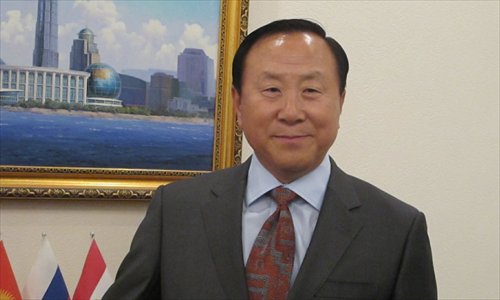
Zhang Xinfeng (张新枫)
Editor's Note:GT: China has been under more severe threat of terrorism since 2013, from the Tiananmen attack in October to the bombing in Urumqi this May. Within the framework of the SCO, are the other SCO members under similar threat?
Zhang: The attacks that originated from China's Xinjiang are not isolated. They are closely associated with international terrorism, especially terrorist activities in Central Asia.
One of the main instigations of these attacks in Xinjiang is that the terrorists watched videos and listened to tapes online. These files ignite religious extremism and inflame separatist sentiments, and are produced outside of China. This is a new challenge that the SCO faces now.
GT: What has the SCO done in maintaining regional security in the past few years?
Zhang: Since its establishment, the SCO has prioritized security as the main cooperation aspect among its members. Two organizations have been established: One is the secretary committee in Beijing and the other is the anti-terrorist structure in Tashkent.
The latter is a permanent organization and also a professional one in cracking down terrorism. In the past decade, we carried out pragmatic activities in coordinating member states, cracking down on the "three evil forces," namely terrorism, separatism and extremism, processing intelligence and improving the legal basis of this work.
GT: How does the SCO crack down on the "three evil forces?"
Zhang: As the "three evil forces" make use of the Internet to carry out a trans-border terrorist holy war to separate sovereignty countries, our anti-terrorist structure established a joint expert team from all SCO members later last year to deal with the threat from the Internet.
The member countries also cooperate closely in sharing intelligence. They carry out exercises to raise the capability of these countries in dealing with challenges. Those working at the Executive Committee of the Anti-Terrorist Structure are personnel from the security department of Central Asian countries. We also initiated cooperation on border defense last year.
GT: The US will withdraw its troops before the end of 2014 from Afghanistan and some Central Asian countries have provided bases for the US troops to transit through. Will it pose a threat to regional security? How will the SCO respond?
Zhang: After the US withdrawal, Afghanistan will face many uncertainties. There are quite a number of terrorist organizations embedded in the country. And it is the largest base for opium production in the world. Drugs are closely associated with the "three evil forces" as funds from the drug trade help terrorism spread in the region, increasing instability. We should be alert that some terrorists may make use of the Afghan issue and the drug problems to shake regional security.
Afghanistan's neighboring countries are either members or observers of the SCO. Afghanistan itself is an observer of the SCO, and the SCO has been trying to make its transition smoothly. In October 2013, we held a security meeting on law enforcement and cooperation with the member states. This year, we will hold one with observer countries.
GT: What's the SCO's role in assisting the Silk Road economic belt?
Zhang: The SCO countries have welcomed this initiative by President Xi. Central Asian countries all hope that people can live better lives and the economy can be developed. But the premise is a secure environment.
GT: A representative office of NATO was opened in Tashkent on May 16. How do you see its impact in the region?
Zhang: So far it is not clear what role it will play in the region and we haven't formed a working relationship with them. The SCO is an open organization and is willing to cooperate with any international organization.



